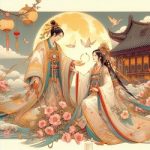Heartwarming tale of love: A Wedding Forty Years Late
In October 1968, Wen Lei followed the trend of the times, joining the urban youth in the “Down to the Countryside” movement. He was assigned to a production team in a remote mountain village in his county, while a girl named Cui Ping from Shanghai was assigned to a neighboring production team.
Wen Lei was sent to the countryside, where his daily routine consisted of earning work points, chopping firewood, cooking, and washing clothes in the river. Cui Ping, having been sent from Shanghai to the southern mountains of Anhui, found the lush green bamboo forests and crystal-clear streams to be fresh and exciting. In the evenings, she would wash clothes by the river and hum softly to herself as she admired her reflection in the water: “In that faraway place, there’s a lovely girl. Everyone who passes her tent looks back with longing…”
One day, as Cui Ping was washing clothes, her basin was swept away by the current. She chased after it barefoot, but just as she was about to retrieve it, she slipped and fell into the river. “Help!” she cried, and in that moment, she saw a man on a nearby wooden bridge throw down his bundle of firewood and rush toward her…
When she awoke, she was lying in bed. The landlady brought her a steaming bowl of noodles and told her that the man who saved her was Wen Lei, a fellow urban youth who had been sent down to the neighboring team.
A week later, Wen Lei came to visit her with six eggs, his face filled with sincerity and simplicity. From that day on, the two grew closer. They walked together at sunset, as the golden light bathed the hills; they enjoyed the crisp autumn air and the scent of chrysanthemums; by the small bridge and the river, they became inseparable. Two years later, fortune smiled upon them as they were both offered jobs at a state-owned enterprise in the county. Having met, known each other, and fallen in love, it was only natural that they would soon marry.
The night before they were to register their marriage, Cui Ping felt a wave of happiness at the thought of becoming his bride the next day. However, before dawn, her roommate rushed to Wen Lei’s place, sweat streaming down her face, to tell him that Cui Ping had fallen seriously ill and was taken to the county hospital. Wen Lei rushed to the hospital, where a feverish and weakened Cui Ping, tears of guilt in her eyes, gripped his hand. “Everything will be alright,” Wen Lei reassured her, though his voice was filled with helplessness. The doctor recommended transferring her to another hospital immediately.
After two weeks of treatment, the head doctor told Wen Lei, “Your girlfriend has rheumatic syndrome. Her limbs will gradually become paralyzed. This disease is difficult to cure, and you need to prepare yourself for a long-term situation.” Wen Lei, filled with hope moments earlier, stood stunned and speechless.
Back in the county, Cui Ping was assigned a small room by her workplace. Her parents, exhausted and anxious, entrusted her to Wen Lei before returning to Shanghai. Every morning, Wen Lei would come to her room to light the stove, boil water, prepare breakfast, and brew her herbal medicine before heading to work. After work, he would return to take care of her before dragging his weary body back to his dormitory.
On sunny days, Wen Lei would push Cui Ping in a bicycle cart to the outskirts of the county, where they would admire the red leaves of Shui Xi and watch butterflies flutter by at Taizi Spring. On rainy weekends, they spent quiet afternoons indoors, reminiscing about their bittersweet days in the countryside.
Six years passed in the blink of an eye, and in 1977, the news of the reinstatement of the college entrance exam spread through the county. Cui Ping’s limbs were partially paralyzed by then, and as the exam approached, she was unable to sleep. She could no longer bear to hold Wen Lei back and made the most painful decision of her life. The next morning, she tearfully mailed a letter to her parents.
After the three-day exam, Wen Lei rushed to Cui Ping’s place, only to find it empty. On the table lay a letter: “Wen Lei, I have gone back to Shanghai with my mother. Thank you for taking care of me all these years. Because of my illness, we cannot be together forever. Please forget me. —Cui Ping.”
Tears streamed down Wen Lei’s face, and soon, his sorrow turned into heart-wrenching cries.
In Shanghai, Wen Lei visited Cui Ping’s parents’ house and was introduced to a pockmarked man. Cui Ping’s parents told him that this man was Cui Ping’s fiancé. The man shook Wen Lei’s hand firmly, thanking him deeply for taking care of Cui Ping all these years. Wen Lei, try as he might, could not get a chance to see Cui Ping. Ten days later, he returned to the county on a freight truck.
Wen Lei was later accepted into the accounting program at a university in Nanjing. During the summer break, his sister introduced him to a rural girl named Chun Lan. Faced with his hunchbacked sister, Wen Lei couldn’t refuse. As the only son in a family with three generations, it was his sister who had raised him after their mother passed away. He felt that his sister had bent herself into a bridge to help him reach success. If their mother were alive, she would surely have done the same.
A marriage without love was like chewing tasteless wax. After graduating, Wen Lei moved to the south, still carrying Cui Ping in his heart, and worked mechanically at an accounting firm. Failing to strike gold, he soon returned to the county and took up a position as a chief accountant at a commercial company.
Several years later, on a quiet night, Chun Lan, unable to endure her husband’s perpetual gloom, suggested a divorce. Wen Lei replied, “I know I’ve wronged you, but I can’t change how I feel. Thank you for understanding.” A marriage is just a way of life, and when that way of life no longer fits, divorce is the wisest choice. Wen Lei took a photo from under a glass panel and left everything else to Chun Lan.
Years passed, and Wen Lei lived in a cycle of memories. One spring night, he got up in the middle of the night, sat by the window, and watched the clouds fade and the moon reappear. The moon was full, the water murmured, and by the stream, Cui Ping was as beautiful as ever, her eyes clear and serene, like the blue spring water, reflecting peace. The heavens had been cruel—where was she now?
Finally, one day, fate smiled upon him. From one of Cui Ping’s close friends, Wen Lei learned that the pockmarked man he had met in Shanghai was not Cui Ping’s fiancé, but her cousin. Cui Ping’s parents had both passed away, and she was now living with her sister.
At her sister’s home, Wen Lei found Cui Ping lying in bed. Forty years had passed in the blink of an eye, and her once-beautiful hair was now silver. Her frail body, ravaged by illness, looked helpless as a child, her eyes clouded with a mixture of suffering and sorrow for the choices made so long ago.
“You came!” Cui Ping’s eyes brightened as Wen Lei appeared, a glimmer of life returning—a plea for her first love’s return, a final hope for the love of her youth.
“Come home with me,” Wen Lei whispered, cradling her in his arms. His voice was tender, his embrace familiar and comforting. The firmness of his once-strong arms overwhelmed her with emotion.
Both acknowledged the pure and untouched corner of their hearts, and love, like the last leaf of autumn, finally found a place to rest.
In their hometown, they held a wedding. Cui Ping, dressed in a white wedding gown, sat in a wheelchair. Wen Lei, in a brand-new suit, pushed her slowly into the banquet hall. Chun Lan and her husband bustled about; his sister and brother-in-law were filled with a mixture of sorrow and joy. It was a wedding forty years late, and everyone marveled at the purity of the love from that era, a love as untainted as the clear skies of those days. Every guest at the wedding shed tears of emotion.
Illness could not stop the blossoming of love, and time could not destroy the true love held in their hearts. Time may age us, but love remains forever young. True love is eternal, and the sky is ablaze with colors.
Thank you for reading! ” Sitestorys “


